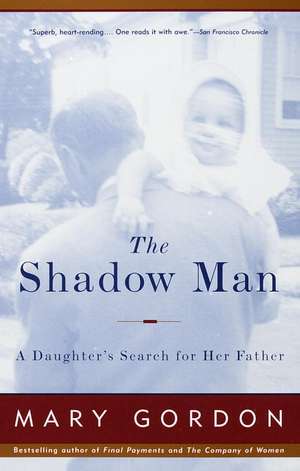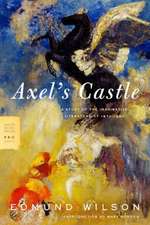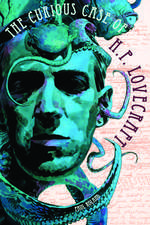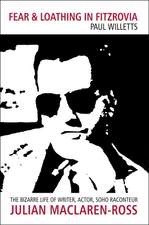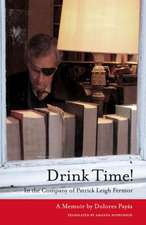The Shadow Man: A Daughter's Search for Her Father
Autor Mary Gordonen Limba Engleză Paperback – 31 mar 1997
Preț: 104.07 lei
Nou
Puncte Express: 156
Preț estimativ în valută:
19.92€ • 20.53$ • 16.82£
19.92€ • 20.53$ • 16.82£
Carte disponibilă
Livrare economică 10-24 februarie
Preluare comenzi: 021 569.72.76
Specificații
ISBN-13: 9780679749318
ISBN-10: 0679749314
Pagini: 304
Ilustrații: PHOTOGRAPHS THROUGHOUT
Dimensiuni: 133 x 204 x 15 mm
Greutate: 0.29 kg
Ediția:Vintage Books
Editura: VINTAGE BOOKS
ISBN-10: 0679749314
Pagini: 304
Ilustrații: PHOTOGRAPHS THROUGHOUT
Dimensiuni: 133 x 204 x 15 mm
Greutate: 0.29 kg
Ediția:Vintage Books
Editura: VINTAGE BOOKS
Extras
The night of my father's heart attack, January 14, 1957, my mother and I went to my aunt's house to watch television, as we always did on Friday nights. We watched shows about silly crackbrained girls: My Little Margie, My Friend Irma. Then the prizefights started. The women and the children disappeared. We played or talked somewhere else: we could hear the bell signaling a knockout or the end of a round, but it seemed terribly far away, in some country that had nothing to do with us.
My uncles drank beer out of glasses that I believed had come from Germany. They frightened me; the war hadn't been over many years, and I had visions of women with their heads shaved, made to stand naked in town squares, shot by Nazis. Or children starving, heroic, with one chocolate coin between them, which they ran a wet finger over each day, licking their finger, making the chocolate last for a month. I got the idea of women with shaved heads from television: Playhouse 90, a show my aunt and my mother were watching one night while the uncles were out at a basketball game. It was a show I wasn't supposed to watch. All the children were meant to be asleep, and my cousins were, but I crept down and watched the television from a stairwell, where the women didn't see me. I'd stolen a box of chocolate stars and shoved them hypnotically into my mouth as the television spoke about the woman with her shaved head.
I was sick with guilt and sugar. But I always was when I went to my aunt's house. We were always allowed to eat too much, too many things that were bad for us. We ate potato chips and cheap sweets and drank all the Cokes in the refrigerator; we laughed too much and were warned that that kind of laughing would always end up in tears. Sometimes it did, but not always, and it made us distrust our mothers because we knew they believed it always would. My cousins and I fought because we all wanted to be the mother-except occasionally one cousin would agree to be the child if she could be spanked on her bare bottom, hard. Afterward, I'd lie in my bed, feeling I'd just escaped something modern and dangerous.
That night, after I'd fallen asleep, the phone rang. It was Bellevue Hospital: my father had had a heart attack in the Forty-second Street library.
There is a sound of disaster, and a quiet after it, when the universe becomes still from shock, the wind stops, the light is colorless, and humans have no words because no words fit the enormity. Then a hum enters the air, and normal activity begins again, but slowly, as if everyone were underwater. People move, pick things up in their hands, walk from place to place, but the hum supports each action. You can mark the time when the disaster is complete and something else-the rest of life-begins. You know this because the hum no longer supports each act. I have never been in an earthquake, or the aftermath of battle, but I know their sound: the shocked sound of proximity to death. I heard it when my mother hung up the phone and said, "Your father's had a heart attack."
For thirty days, my mother drove to the hospital each evening to see my father. I wasn't allowed to go. I stayed with my grandmother. I slept in her dark room with the frightening pictures: the brown replica of the Shroud of Turin, a picture of Christ with long, smooth, girlish hair, pointing to his Sacred Heart, the size and shape of a pimento or a tongue. Most mysterious: a picture made of slats. You turned your head one way: it was the Scourging at the Pillar. Another turn of the head produced Jesus Crowned with Thorns. If you looked absolutely straight ahead, you saw the Agony in the Garden. I was kept awake by these pictures and by the room's bitter smells: lavender, ammonia, hair oil, liniment. Pine Sol always at the bottom of the commode: a green pool reminding you inevitably of the corruption that you, as a human, had no right pretending you could rise above.
One Monday night, I woke for nothing. It was nearly midnight. I went into the living room. My mother let me sit on the couch beside her and watch television. We watched Jack Paar. Ten minutes later, the phone rang. It was the hospital. My father had just died.
It was then that my life split in two, into the part when my father was alive and the part when he was not. Since the first part lasted only seven years, my life has always felt unbalanced. The part of my life after his death kept growing; there was no way to stop it, except by my own death. There was no way to lengthen the other, to have more time with my father as a living man.
I understood what had come to an end. My mother and I moved out of our apartment into my grandmother's house. I never saw the apartment again, and I never saw most of the things I'd had there.
I don't know what happened to it all. The furniture, the lamps, the cheerful dishes. And my toys: my windup Cinderella, my tin dollhouse, the Alice in Wonderland rug. They were banished. Were they burned, sold, put upstairs in the attic? I was afraid to ask. My aunt who lived with my grandmother, with whom I would now live, said I had to remember there was very little room in the house. I understood. But nobody said anything to me about what had happened to my things. Everything was simply gone, no longer on earth. It had disappeared, as my father's body, for no better reason, had disappeared.
My mother bought twin beds and flowered cardboard dressers. We moved into an empty room in my grandmother's house. My mother impressed upon me that my aunt and grandmother were doing us a big favor in letting us live with them, that we mustn't seem to be in the way. I saw that she was happy. She had come back home. She wouldn't have to work so hard; she wouldn't have to come home from the office and cook the supper and do the washing and the ironing.
But she seemed to have forgotten what we'd had. She didn't miss our apartment, which was clearly much more like the movies than my grandmother's house. She didn't miss the Pyrex dishes in Technicolor shades, her wedding china with its playful patterning of unnaturally colored fruits. She didn't miss our trips to the movies, or listening to the radio (we'd had no television; my father wouldn't allow it). She didn't miss the songs we sang from musicals, our imitations of Irish priests and Italian barbers. She didn't miss going out to eat. She seemed to prefer my grandmother's dark living room, the lamps with golden handles and maroon bases and pictures of men and women with flowing hair and hats with feathers. The bust of Christ crowned with thorns, the tears flowing down his cheeks, which I enjoyed touching, feeling I'd stolen grace. And beside the head of Christ, a thin black stork riding on a turtle's back. It was said to be bronze, but no one believed that. Next to the stork there was a clump of peat, wedge-shaped and porous, that my grandmother had brought from Ireland. She wasn't frightened, as I was, of the bathroom upstairs with its blueblack linoleum and its pitcher full of overripe philodendron, whose stems I could imagine rotting in the yellowish water in which they stood.
She didn't seem to miss my father. There was no trace of him in my grandmother's house, and he was talked about only if I brought him up. I understood that if he was to be remembered, it would be up to me.
For a while, I thought he would come back. At night, I'd climb the dark stairs, certain that when I lit the light in the bedroom, he'd be there waiting.
Sometimes I wasn't sure whether or not I too had died. Often when I was near the edge of sleep, or ill, or cold, or when I became hypnotized by a repetitive physical event-the water going down the bathtub drain, a record spinning on the turntable-I would be caught up in a frightening spiral of language. I would hear a voice, my own, but speaking from so far away that it was barely recognizable. The voice was saying, "What does it mean to be alive?" And the words had no meaning. Particularly the two important ones:
"mean" and "alive." I was looking down at myself like a spirit peering at a corpse. And yet neither the spirit nor the corpse had any connection with each other or with me, the thing once comprehensibly known as "I" but now something else, something I couldn't name.
I had to allow for the possibility that I might be only an idea-but in the mind of whom? Or what? Not God, certainly. I knew it wasn't God; at that moment God was only one more instance of failed language. I longed for someone to rescue me, but I didn't know what would be rescued or what rescue would entail. The past was blotted out and memory obliterated. I inhabited a sickening present without words. Without, therefore, a future. If I was dead, I must always have been, and I would always be. The region I inhabited wasn't one where I would be reunited with my father. What was my father? Only another word I didn't understand. A figure in a mist, stirring no impulse of recognition or recall.
After a few minutes, a few hours, a few days (time had become unmeasurable), I would return to a place where I could use words without terror, that is to say, use them without questioning their meaning as I spoke. I could understand, be understood. I still felt unrooted, but at least I knew what I was about. I had a task. I was looking for the place where my father and I once were and where we could be once again. I peered through fog for a glimpse of a man who could not be touched or joined. I knew I wouldn't see my father's face again, or feel his breath, or hear his voice, but if I was journeying back in memory to places we had been together, I was engaged in a quest that was not only admirable but, most important, meaningful.
But this search wasn't my only job. I had another one, only partially connected with my father: I was trying to obey the law. A law that was not monochrome and flat but complex, full of color and gradation and interlocking design. Law like a peacock's tail that spread and spread and could repay endless attention. At the center of the fan, in the densest, most vivid place, were the Ten Commandments; then lighter, less crucial, the Six Commandments of the Church, related to the rules of worship. There were the Seven Deadly Sins; and then, farther out, more remote, and opposite them, their reverse, the Virtues, Theological, Cardinal, Moral; and the Works of Mercy, Corporal and Spiritual. But the law I continually broke was one of the most basic. My specialized knowledge did me no good. Every few days found me in a state of mortal sin. Impurity was its name.
My experience of mortal sin wasn't like the ones I've read about in semicomic memoirs. I wasn't afraid of going to hell. Knowing the law so well, I knew that even if I were hit by a car, there would be one moment of consciousness that would allow me to say the word "sorry," even the syllable "sor," and that would be enough. Perhaps I would have years and years of Purgatory, but Purgatory was, in its way, desirable. Yes, the agonies would be real, but all the fine people, the interesting sinners, would be there, undergoing a process of chastening or burnishing that in its communal aspects seemed noble. So it wasn't eternal damnation that I feared; it wasn't even fear that moved me. It was shame, a sense of my defilement in relation to the infinite purity of God's love. A filthiness that seemed as if it should be public, made worse because in the public eye, in fact, I was perceived to be exceptionally good. The nuns in school who chose me as class monitor, the slow or unruly children who were made to sit next to me and look up to me as an example of probity and industry-what would they think if they knew the degradation that was the truth of my inner life? I went to confession every three or four days, always confessing the same sin in the same words: "I was impure with myself." The worst moments occurred before I spoke, when I could see the priest's shadow on the screen that separated us, and imagine his chastisement, which mostly never came. The priests wanted me out quickly; they were probably more embarrassed than I. But the words of self-accusation, once spoken, were the gate that led to my exaltation. Only by saying them could I earn absolution and the most perfect sentence I have ever yet heard spoken: "Go in peace."
Since I came to life, or a kind of incorporeal life, in these moments of exaltation, it was natural that I should try to do my job-remembering my father-by enclosing my understanding of his life and death in one of the shining vessels that the Church provided. Ecclesiastical language is full of names for vessels: chalice, ciborium, monstrance, pyx; there must be containers to enclose, keep safe, keep intact, keep protected from the world's contamination the sacred matter-the Body and Blood of Christ-in the form of the natural and the ordinary-bread and wine. This transformation of the ordinary into the sacred is called transubstantiation, and that was what I needed for my father's history.
I needed to think of it as only appearing to be ordinary-like the host and the wine-so I could bring myself to life, or back to life, so I could save myself or resurrect myself. His history was my lifeblood, as the Eucharist was the lifeblood of the Church. And so I contained my father's life and death in one of the forms the Church provided, as it provided the containers of precious metals for the Host, the wine. The mysteries of the faith were held in sacred stories. And I wrote my father's history as one of the Lives of the Saints.
By doing this, I could see my father's death not as something that could have happened to anybody, an expected consequence of living, and therefore without meaning. Loss, absence, the half-life of my life, weren't ordinary or purposeless. My father's life and death became part of something grand, enormous. And so mine did, too.
My uncles drank beer out of glasses that I believed had come from Germany. They frightened me; the war hadn't been over many years, and I had visions of women with their heads shaved, made to stand naked in town squares, shot by Nazis. Or children starving, heroic, with one chocolate coin between them, which they ran a wet finger over each day, licking their finger, making the chocolate last for a month. I got the idea of women with shaved heads from television: Playhouse 90, a show my aunt and my mother were watching one night while the uncles were out at a basketball game. It was a show I wasn't supposed to watch. All the children were meant to be asleep, and my cousins were, but I crept down and watched the television from a stairwell, where the women didn't see me. I'd stolen a box of chocolate stars and shoved them hypnotically into my mouth as the television spoke about the woman with her shaved head.
I was sick with guilt and sugar. But I always was when I went to my aunt's house. We were always allowed to eat too much, too many things that were bad for us. We ate potato chips and cheap sweets and drank all the Cokes in the refrigerator; we laughed too much and were warned that that kind of laughing would always end up in tears. Sometimes it did, but not always, and it made us distrust our mothers because we knew they believed it always would. My cousins and I fought because we all wanted to be the mother-except occasionally one cousin would agree to be the child if she could be spanked on her bare bottom, hard. Afterward, I'd lie in my bed, feeling I'd just escaped something modern and dangerous.
That night, after I'd fallen asleep, the phone rang. It was Bellevue Hospital: my father had had a heart attack in the Forty-second Street library.
There is a sound of disaster, and a quiet after it, when the universe becomes still from shock, the wind stops, the light is colorless, and humans have no words because no words fit the enormity. Then a hum enters the air, and normal activity begins again, but slowly, as if everyone were underwater. People move, pick things up in their hands, walk from place to place, but the hum supports each action. You can mark the time when the disaster is complete and something else-the rest of life-begins. You know this because the hum no longer supports each act. I have never been in an earthquake, or the aftermath of battle, but I know their sound: the shocked sound of proximity to death. I heard it when my mother hung up the phone and said, "Your father's had a heart attack."
For thirty days, my mother drove to the hospital each evening to see my father. I wasn't allowed to go. I stayed with my grandmother. I slept in her dark room with the frightening pictures: the brown replica of the Shroud of Turin, a picture of Christ with long, smooth, girlish hair, pointing to his Sacred Heart, the size and shape of a pimento or a tongue. Most mysterious: a picture made of slats. You turned your head one way: it was the Scourging at the Pillar. Another turn of the head produced Jesus Crowned with Thorns. If you looked absolutely straight ahead, you saw the Agony in the Garden. I was kept awake by these pictures and by the room's bitter smells: lavender, ammonia, hair oil, liniment. Pine Sol always at the bottom of the commode: a green pool reminding you inevitably of the corruption that you, as a human, had no right pretending you could rise above.
One Monday night, I woke for nothing. It was nearly midnight. I went into the living room. My mother let me sit on the couch beside her and watch television. We watched Jack Paar. Ten minutes later, the phone rang. It was the hospital. My father had just died.
It was then that my life split in two, into the part when my father was alive and the part when he was not. Since the first part lasted only seven years, my life has always felt unbalanced. The part of my life after his death kept growing; there was no way to stop it, except by my own death. There was no way to lengthen the other, to have more time with my father as a living man.
I understood what had come to an end. My mother and I moved out of our apartment into my grandmother's house. I never saw the apartment again, and I never saw most of the things I'd had there.
I don't know what happened to it all. The furniture, the lamps, the cheerful dishes. And my toys: my windup Cinderella, my tin dollhouse, the Alice in Wonderland rug. They were banished. Were they burned, sold, put upstairs in the attic? I was afraid to ask. My aunt who lived with my grandmother, with whom I would now live, said I had to remember there was very little room in the house. I understood. But nobody said anything to me about what had happened to my things. Everything was simply gone, no longer on earth. It had disappeared, as my father's body, for no better reason, had disappeared.
My mother bought twin beds and flowered cardboard dressers. We moved into an empty room in my grandmother's house. My mother impressed upon me that my aunt and grandmother were doing us a big favor in letting us live with them, that we mustn't seem to be in the way. I saw that she was happy. She had come back home. She wouldn't have to work so hard; she wouldn't have to come home from the office and cook the supper and do the washing and the ironing.
But she seemed to have forgotten what we'd had. She didn't miss our apartment, which was clearly much more like the movies than my grandmother's house. She didn't miss the Pyrex dishes in Technicolor shades, her wedding china with its playful patterning of unnaturally colored fruits. She didn't miss our trips to the movies, or listening to the radio (we'd had no television; my father wouldn't allow it). She didn't miss the songs we sang from musicals, our imitations of Irish priests and Italian barbers. She didn't miss going out to eat. She seemed to prefer my grandmother's dark living room, the lamps with golden handles and maroon bases and pictures of men and women with flowing hair and hats with feathers. The bust of Christ crowned with thorns, the tears flowing down his cheeks, which I enjoyed touching, feeling I'd stolen grace. And beside the head of Christ, a thin black stork riding on a turtle's back. It was said to be bronze, but no one believed that. Next to the stork there was a clump of peat, wedge-shaped and porous, that my grandmother had brought from Ireland. She wasn't frightened, as I was, of the bathroom upstairs with its blueblack linoleum and its pitcher full of overripe philodendron, whose stems I could imagine rotting in the yellowish water in which they stood.
She didn't seem to miss my father. There was no trace of him in my grandmother's house, and he was talked about only if I brought him up. I understood that if he was to be remembered, it would be up to me.
For a while, I thought he would come back. At night, I'd climb the dark stairs, certain that when I lit the light in the bedroom, he'd be there waiting.
Sometimes I wasn't sure whether or not I too had died. Often when I was near the edge of sleep, or ill, or cold, or when I became hypnotized by a repetitive physical event-the water going down the bathtub drain, a record spinning on the turntable-I would be caught up in a frightening spiral of language. I would hear a voice, my own, but speaking from so far away that it was barely recognizable. The voice was saying, "What does it mean to be alive?" And the words had no meaning. Particularly the two important ones:
"mean" and "alive." I was looking down at myself like a spirit peering at a corpse. And yet neither the spirit nor the corpse had any connection with each other or with me, the thing once comprehensibly known as "I" but now something else, something I couldn't name.
I had to allow for the possibility that I might be only an idea-but in the mind of whom? Or what? Not God, certainly. I knew it wasn't God; at that moment God was only one more instance of failed language. I longed for someone to rescue me, but I didn't know what would be rescued or what rescue would entail. The past was blotted out and memory obliterated. I inhabited a sickening present without words. Without, therefore, a future. If I was dead, I must always have been, and I would always be. The region I inhabited wasn't one where I would be reunited with my father. What was my father? Only another word I didn't understand. A figure in a mist, stirring no impulse of recognition or recall.
After a few minutes, a few hours, a few days (time had become unmeasurable), I would return to a place where I could use words without terror, that is to say, use them without questioning their meaning as I spoke. I could understand, be understood. I still felt unrooted, but at least I knew what I was about. I had a task. I was looking for the place where my father and I once were and where we could be once again. I peered through fog for a glimpse of a man who could not be touched or joined. I knew I wouldn't see my father's face again, or feel his breath, or hear his voice, but if I was journeying back in memory to places we had been together, I was engaged in a quest that was not only admirable but, most important, meaningful.
But this search wasn't my only job. I had another one, only partially connected with my father: I was trying to obey the law. A law that was not monochrome and flat but complex, full of color and gradation and interlocking design. Law like a peacock's tail that spread and spread and could repay endless attention. At the center of the fan, in the densest, most vivid place, were the Ten Commandments; then lighter, less crucial, the Six Commandments of the Church, related to the rules of worship. There were the Seven Deadly Sins; and then, farther out, more remote, and opposite them, their reverse, the Virtues, Theological, Cardinal, Moral; and the Works of Mercy, Corporal and Spiritual. But the law I continually broke was one of the most basic. My specialized knowledge did me no good. Every few days found me in a state of mortal sin. Impurity was its name.
My experience of mortal sin wasn't like the ones I've read about in semicomic memoirs. I wasn't afraid of going to hell. Knowing the law so well, I knew that even if I were hit by a car, there would be one moment of consciousness that would allow me to say the word "sorry," even the syllable "sor," and that would be enough. Perhaps I would have years and years of Purgatory, but Purgatory was, in its way, desirable. Yes, the agonies would be real, but all the fine people, the interesting sinners, would be there, undergoing a process of chastening or burnishing that in its communal aspects seemed noble. So it wasn't eternal damnation that I feared; it wasn't even fear that moved me. It was shame, a sense of my defilement in relation to the infinite purity of God's love. A filthiness that seemed as if it should be public, made worse because in the public eye, in fact, I was perceived to be exceptionally good. The nuns in school who chose me as class monitor, the slow or unruly children who were made to sit next to me and look up to me as an example of probity and industry-what would they think if they knew the degradation that was the truth of my inner life? I went to confession every three or four days, always confessing the same sin in the same words: "I was impure with myself." The worst moments occurred before I spoke, when I could see the priest's shadow on the screen that separated us, and imagine his chastisement, which mostly never came. The priests wanted me out quickly; they were probably more embarrassed than I. But the words of self-accusation, once spoken, were the gate that led to my exaltation. Only by saying them could I earn absolution and the most perfect sentence I have ever yet heard spoken: "Go in peace."
Since I came to life, or a kind of incorporeal life, in these moments of exaltation, it was natural that I should try to do my job-remembering my father-by enclosing my understanding of his life and death in one of the shining vessels that the Church provided. Ecclesiastical language is full of names for vessels: chalice, ciborium, monstrance, pyx; there must be containers to enclose, keep safe, keep intact, keep protected from the world's contamination the sacred matter-the Body and Blood of Christ-in the form of the natural and the ordinary-bread and wine. This transformation of the ordinary into the sacred is called transubstantiation, and that was what I needed for my father's history.
I needed to think of it as only appearing to be ordinary-like the host and the wine-so I could bring myself to life, or back to life, so I could save myself or resurrect myself. His history was my lifeblood, as the Eucharist was the lifeblood of the Church. And so I contained my father's life and death in one of the forms the Church provided, as it provided the containers of precious metals for the Host, the wine. The mysteries of the faith were held in sacred stories. And I wrote my father's history as one of the Lives of the Saints.
By doing this, I could see my father's death not as something that could have happened to anybody, an expected consequence of living, and therefore without meaning. Loss, absence, the half-life of my life, weren't ordinary or purposeless. My father's life and death became part of something grand, enormous. And so mine did, too.
Textul de pe ultima copertă
Mary Gordon's father died when she was seven. For a long time she was content to remember David Gordon as the man who had loved her 'more than God' and then vanished. In this book on of our finest novelists sets out to retrieve her father from the mausoleum of mourning. What she discovers--in libraries, archives, and her own memory--tests her credulity and her forgiveness.
Descriere
In "The Shadow Man", the bestselling author of "Final Payments" and "The Company of Women" elevates the memoir into an uncompromising and unforgettable art form as she seeks to learn the truth about her lost father. 20 photos.
Notă biografică
Mary Gordon
